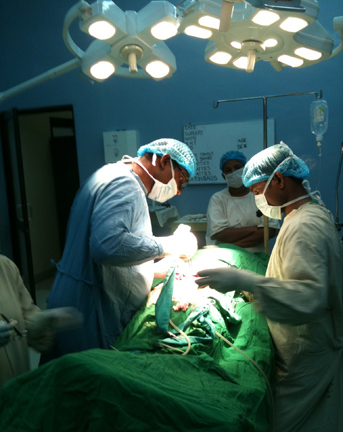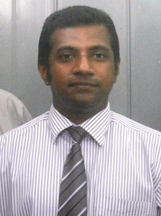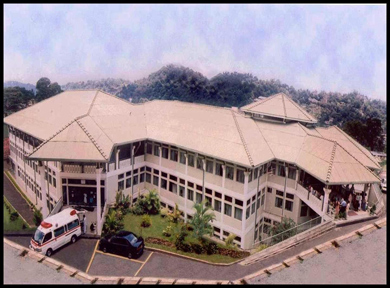|

A kidney transplant surgery in progress |
Deceased Owner Kidney Transplant:
Gift of life for the dying
by Carol Aloysius
Last year the Traffic Police unveiled some startling facts: Deaths
from road accidents across the island recorded a chilling 2,400. That is
not all. Traffic sources estimate the death rates could go up to 2,800
or more, taking into consideration the increasing number of vehicles
that are crowding the roads day by day. They say 60 percent of the
victims of these accidents usually die on the spot, their bodies smashed
beyond repair.
So where do the rest end up? "At Intensive Care Units in various
State hospitals, where they are more often 'Brain Dead," say hospital
sources.
"If we can get the relatives of these persons to consent to donate
the organs of these brain dead persons, we can save the lives of
hundreds of patients whose lives are running out as they wait in long
queues lists for a kidney transplant," says Consultant Nephrologists,
Kandy General Hospital, Dr Anura Abeysinghe, who is also the Project Co-ordinator
of an innovative pilot project aimed at doing just that.
"At present there is a huge waiting list for kidney transplants from
patients whose lives depend on getting a new kidney. Since kidney
donations are not allowed except from a living close relative (to
prevent illegal trafficking of kidneys), their chances of obtaining a
matching kidney from a close relative is usually remote. Their only hope
for living is the frequent dialysis they undergo," he points out.
Project 'Deceased Owner Kidney Transplant', recently launched on the
instructions of the Health Ministry at the Kandy General Hospital,
however will change this negative scenario, he believes.
Not all 'brain dead 'persons brought into the hospital however are
victims of road accidents.
Explaining the kind of 'brain dead' persons who are usually rushed to
the ICU, he says, "We have categorised them in the following manner:
those who have met with road accidents; those who have attempted
suicide; and those who have had spontaneous bleeding into the brain due
to hypertension and malfunction of the brain. All of them are kept in
the ICU, where the rest of their organs are kept alive and working on
ventilators. These machine driven organs will stay alive for a short
period of 3-4 days, until they are taken off the machine. This tiny
period of time between the diagnosis of 'brain dead' and the total
cessation of all organs , offers a tiny window of opportunity for the
relatives of the brain dead person to agree to give their consent for us
to retrieve his/her kidney and transplant it to save the life of a
person in need of a healthy kidney.." .
|

Consultant Nephrologist,
Kandy General Hospital, Dr Anura Abeysinghe |
Since most people have two kidneys, retrieving two kidneys from one
'brain dead' person can save two lives since you can live with one
kidney, he adds.
Experience
Kidney Transplant using donors from brain dead is by no means a new
procedure. In the US, UK, and other western countries, it is now an
accepted practice where living donors have their consent stamped on
their driving licences, passports and other identification forms,.
In the event of an accident, authorities in any hospital to where
they are taken to are expected to respect the wishes of the donees if
they are brought in 'brain dead'. In some hospitals abroad, even
helicopters and ambulances are lined up to transport a newly retrieved
kidney to a patient in a hospital in some other state, with trained
health workers accompanying the carefully packed kidney to its final
destination.
Health staff in these hospitals are also given extra training to deal
with such patients.
For the skilled operating surgeons at the Kandy General Hospital too
this is not the first time they have carried out this relatively new
procedure. As Dr Abeysinghe points out, "Our initial two Deceased Donor
transplants were performed in 2004. Since then we have notched up 70
such surgeries. What's more, all of the patients are still alive."
The hospital has in addition also performed Living donor Transplants
on 900 patients.
"What our Project has in mind is to streamline these operations and
increase the number of surgeries we can do every year. At present we
have been able to do less than ten per year. But under the new project,
we can do four transplants every month."
Selection
So how are donees selected? On a first come first serve basis? Do
they need to have certain requirements to qualify for a kidney
transplant?
"The answer is 'Yes'.
|

Nephrology unit, Kandy |
"The recipients are all patients who have been registered at this
hospital. They are also all on haemodialysis. We have made separate
lists for them according to blood groups. They are then entered into a
scoring system according to their age and duration of dialysis, and then
grouped before they get selected."
So who selects them eventually?
"Selection is under our automated system. It is the system that
selects the recipients. So no one can accuse us of being prejudiced or
having any bias. You need to be on the Living Donor waiting list for
about three months to be eligible."
And the Deceased Donor list?
"We have just started this project. So we will have to wait and see
the response. The main thing is the public response.
We need to raise a lot of awareness and educate the public about this
as it is still a very new concept. If we get a good response, and the
project is a success, we will be able to save a huge amount of expenses
for the state in terms of treating kidney ailments including dialysis,
as well as minimizing the hardships faced by those patients waiting for
a kidney transplant.
If will also help to reduce the economic woes of people who have to
spend a lot of money transporting their relatives for dialysis from
remote areas, to a dialysis centre," says Dr Abeysinghe.
For those who wish to donate their kidneys for this worthy cause
under this Project, further information can be obtained by contacting
the following numbers:
0773649405/0776662966/ 0716158986 |

